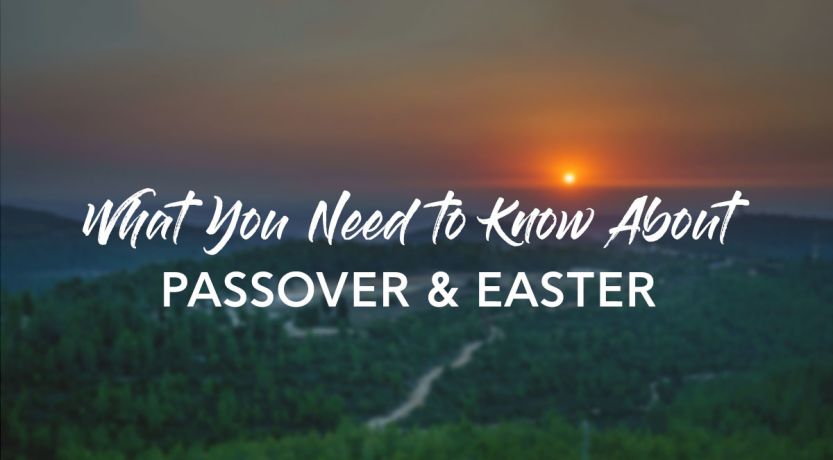What You Need to Know About Passover and Easter
Millions celebrate Easter and consider it the most sacred day of the year. But are Easter celebrations and traditions endorsed in the Bible? And if not, then what is?

Millions around the world celebrate Easter Sunday as the day of Jesus’ resurrection. However, there is not a single verse in the Bible instructing Christians to celebrate His resurrection, nor is there any use of the word Easter in the original text.
Neither Jesus nor His apostles are recorded ever saying anything about Easter Sunday.
(Note: The translators of the 1611 King James Version mistakenly inserted the word Easter in Acts 12:4. The original Greek word pascha is correctly translated “Passover.” The New King James Version and other modern translations have corrected this error.)
Instead of teaching Easter, Jesus commanded His followers to observe the Passover to memorialize His suffering and death.
Where did Easter originate?
In defining the word Easter, Chambers’s Twentieth Century Dictionary quotes the eighth-century scholar the Venerable Bede: “Bede derives the word from Eostre [Eastre], a goddess whose festival was held at the spring equinox.” The connection between Easter and Eostre, an Anglo-Saxon goddess, is apparent. Her pagan celebrations were carried over and adopted by Christianity.
The Encyclopaedia Britannica, 11th edition, in the article “Easter” states: “There is no indication of the observance of the Easter festival in the New Testament, or in the writings of the apostolic Fathers.”
The practice of observing Easter on the first Sunday following the vernal equinox instead of Passover did not originate from God or the Bible, but was an entirely human invention.
Eusebius, writing in the fourth century, recounts events that led to Sunday being established as a celebration of Jesus’ resurrection: “There was a considerable discussion raised about this time, in consequence of a difference of opinion respecting the observance of the paschal season . . .
“Hence there were synods and convocations of the bishops on this question; and all unanimously drew up an ecclesiastical decree, which they communicated to all the churches in all places, that the mystery of our Lord’s resurrection should be celebrated on no other day than the Lord’s day [Sunday]; and that on this day alone we should observe the close of the paschal fasts” (Eusebius’ Ecclesiastical History, Book 5, chapter 23, p. 207).
Accompanying the passage in this 1833 translation is the footnote: “Our word, Easter, is of Saxon origin, and of precisely the same import with its German cognate Ostern . . . The name Easter, as expressive of meaning, is undoubtedly preferable to pascha or passover, but the latter was the primitive name.”
The controversy over the adoption of Easter in place of the Passover continued into the fourth century. In order to resolve this issue, Constantine decreed at the Council of Nicaea that Christians should abandon the Passover and observe Easter.
According to the Zondervan Illustrated Bible Dictionary: “The matter was settled by the Council of Nicea in A.D. 325, which ruled that Easter should be celebrated on the first Sunday after the full moon following the vernal equinox. This is the system followed today” (p. 380).
So observing Easter on the first Sunday following the vernal equinox instead of Passover did not originate from God or the Bible. This was an entirely human invention that directly contradicted God’s Word.
To learn more, read “The Surprising History of Easter.”
Passover in the Bible
Let’s take a closer look at the day God did establish. God instituted the original Passover on the eve of the Israelites’ departure from Egypt (Exodus 12:1-13). It was called “the LORD’s Passover” (verse 11)—because it belonged (and still belongs) to God.
Lambs blood was spread on the Israelites’ doorposts and was a sign for God to pass over their houses and spare the firstborn
The blood was spread on the Israelites’ doorposts and was a sign for God to pass over their houses and spare the lives of the firstborn (verses 7, 13).
The lamb was symbolic of Jesus Christ. Just as the blood of the lamb saved the firstborn, the shed blood of Jesus Christ allows our sins to be forgiven, saving us from the death penalty for sin (Romans 6:23).
It’s only through Christ’s sacrifice that we have any hope of eternal life (John 3:16). The Old Testament Passover pointed forward to Jesus Christ, the true Passover Lamb (John 1:29).
The Passover in the New Testament
When He was a child, Jesus traveled to Jerusalem with His family every year to observe the Passover (Luke 2:40-42). Jesus continued to keep these days throughout His adult life (John 2:23). In fact, He was celebrating the Passover with His disciples on the night before His terrible suffering and death (Matthew 26:17-18, 19-21).
Just as the blood of the lamb saved the firstborn, the shed blood of Jesus Christ allows our sins to be forgiven, saving us from the death penalty for sin.
This meal is often erroneously called “the Last Supper” or “the Lord’s Supper,” which diverts attention from the fact that they were keeping the Passover.
After that Passover meal, Jesus Christ introduced new elements to the Passover service. He set an example of humility by washing His disciples’ feet (John 13:1-17). He said, “For I have given you an example, that you should do as I have done to you . . . If you know these things, blessed are you if you do them” (verses 15, 17, emphasis added throughout).
Next, Jesus instituted the New Testament symbols of the unleavened bread, representing His body, which would be ruthlessly beaten (Luke 22:19), and the wine, representing His shed blood for the forgiveness of sins (Matthew 26:27-28).
When you read the Gospel accounts, you notice that Jesus never said He was abolishing the Passover and replacing it with something different and new. He merely introduced new symbols for the ceremony.
What did Paul teach about the Passover?
Some contend that the Passover is only for Jews. However, even Paul, the apostle commissioned to take the gospel to the gentiles, taught Passover observance as Christ instructed and never once wrote about Easter.
Writing to the Corinthian church, Paul instructed the members (who were predominantly gentile converts) to keep the Passover exactly as Christ taught His disciples. Paul wrote:
“For I received from the Lord that which I also delivered to you: that the Lord Jesus on the same night in which He was betrayed took bread; and when He had given thanks, He broke it and said, ‘Take, eat; this is My body which is broken for you; do this in remembrance of Me.’ In the same manner He also took the cup after supper, saying, ‘This cup is the new covenant in My blood. This do, as often as you drink it, in remembrance of Me.’ For as often as you eat this bread and drink this cup, you proclaim the Lord’s death till He comes” (1 Corinthians 11:23-26).
Members of the Church of God today continue to proclaim the Lord’s death every year at the Passover ceremony, which occurs on the same night Jesus ate the Passover nearly 2,000 years ago.
To learn more about the distinction between the Passover and the Easter holiday, read our blog post “5 Major Differences Between Passover and Easter.”
Date Posted: March 31, 2023



